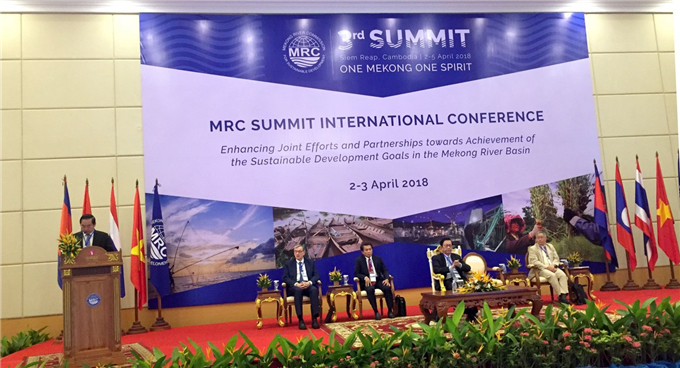Mekong River conference hears of determination to work with LMC

The China-led international organisation for transboundary water management in Mekong River Basin, the Lancang-Mekong Cooperation (LMC), has pledged to work with its counterpart, the Mekong River Commission (MRC), which regulates the lower portion of Southeast Asia’s longest river, to fulfil Sustainable Development Goals (SDGs) for the region.
Sustainable development has been set as the main direction for the MRC’s working plan, the third MRC Summit, which is being held in the Cambodian city of Siem Reap from yesterday until Thursday, heard.
The theme of the summit is “Enhancing Joint Efforts and Partnerships towards Achievement of the SDGs in the Mekong River Basin”.
Cambodian Minister for Water Resources and Meteorology Lim Kean Hor said during the opening ceremony of the international conference yesterday that the MRC would collaborate more closely with China and the LMC to achieve their common goals.
Lim Kean Hor said things had come a long way since the MRC was established in 1995 by the governments of Cambodia, Laos, Thailand and Vietnam. He added it had gradually developed to become recognised as a technical knowledge hub for transboundary water management in the Mekong River Basin.
It had also become an important water diplomacy platform for its member countries and dialogue partners China and Myanmar, he said.
He added that more efforts were being made in joint actions with China and Myanmar to ensure the smooth and collaborative path toward sustainable development of the whole region.
“Our vision is that of an economically prosperous, socially just and environmentally sound Mekong River Basin. And, obviously, this can neither be achieved nor materialised by one individual organisation, government, institution or sector alone,” he said.

The Lancang-Mekong Water Resources Cooperation Centre secretary-general, Zhong Yong, said cooperation under the LMC by the six member countries – China, Cambodia, Laos, Myanmar, Thailand and Vietnam -– would achieve a similar goal to fulfil the SDGs for the region.
Zhong Yong said he considered the LMC and MRC as members of the same family that could forge a strong partnership to achieve their ambitious goals.
He highlighted that the LMC had already been working closely with the MRC and both organisations would have even closer collaboration and information-sharing in the future to deal with common challenges and mitigate the problems of transboundary water management in the Mekong River.
He said China had already shared more information about the water in the Mekong River to downstream countries amid efforts to relieve problems such as floods and droughts. It had also been found that water regulation by upstream dams could significantly reduce the problem of saltwater intrusion in the Mekong River Delta.
The MRC summit is convened once every four years and the current meeting in Siem Reap follows two previous summits, the first in 2010, hosted by Thailand in Hua Hin, and the second in 2014, hosted by Vietnam in Ho Chi Minh City.
While the first summit catapulted MRC’s activities into an era of increased cooperation, the second brought stronger attention to the inter-dependencies between water-use sectors, such as agriculture and energy.
Editor: John Li